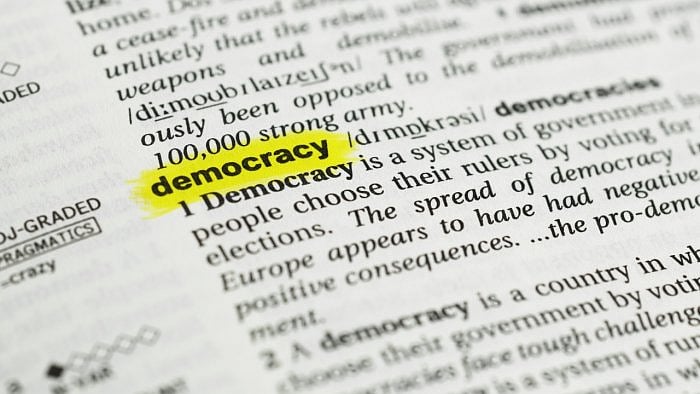
As a nation, we take pride in proclaiming that ours is the largest democracy in the world.
Credit: iStock photo
During a televised interview, Road Transport and Highways Minister Nitin Gadkari, known for his candid demeanour, shared an anecdote that was both revealing and thought-provoking. He recounted meeting an individual who expressed a desire to devote his life to the BJP and the nation. Upon inquiring about the person’s family and financial situation, Gadkari learnt that the individual had shut down his struggling business, leaving his wife and children in precarious circumstances. Gadkari advised: “First take care of your home, because one who cannot manage his home cannot manage the country.” He also remarked that aspiring politicians must have sufficient wealth to remain honest.
This assertion left me grappling with a disconcerting question: Is it impossible to participate in politics without being wealthy? Has India transformed into a plutocracy, or does it still retain its democratic ethos?
Examining the financial status of the members of the 18th Lok Sabha underscores the financial barriers to entry in Indian politics. According to the Association for Democratic Reforms (ADR), an astounding 504 out of 543 elected representatives are crorepatis. The 2024 Lok Sabha elections have reaffirmed the staggering cost of political participation in India. A clear trend emerges: candidates with greater financial clout are far more likely to secure political office.
To put things in perspective, one-third of the contestants in the 2024 elections were crorepatis, but among the winners, this percentage soared to over 90%. In 2009, 58% of MPs were crorepatis, a figure that climbed to 82% in 2014 and 88% in 2019. By 2024, an alarming 93% of MPs belonged to this category. ADR’s study indicates that crorepati candidates had a 19.6% chance of winning, compared to
just 0.7% for non-crorepati candidates.
This data highlights how financial strength marginalises those without resources, undermining the democratic ideal of equal representation. The link between wealth and electoral success is rooted in the critical role money plays in campaigns. Wealthy candidates can fund extensive voter engagement, larger advertising campaigns, and better logistical arrangements—all key to swaying the electorate. Financial strength also translates into increased influence within political parties, further strengthening their candidacy.
The rising dominance of money in Indian politics became apparent in the 2024 Lok Sabha elections. The high entry costs and the increasing role of money in electoral success emphasises the need for significant reforms to guarantee a more egalitarian political process. Resolving these problems is essential to upholding the democratic principles of equitable representation and involvement, guaranteeing that everyone, regardless of financial situation, may enter the political sphere. Everyone should, in principle, be able to participate in politics in a perfect democracy; but the system has only permitted those with connections, resources, and influence to do so. Indian politics thus becomes a vicious cycle where the rich get richer and more powerful, while the poor are excluded from meaningful participation. The wealthy see political office as a means to enhance their influence, with elections becoming a financial investment rather than a commitment to public service.
This skewed representation undermines the quality governance. Despite being elected, lawmakers have limited influence on policymaking, which remains controlled by a select group of party insiders. As a result, elected representative prioritise personal or financial gains over their constitutional duty to serve the public.
How can India break free from this cycle? Greater transparency in all election-related matters, including election funding, stricter enforcement of anti-corruption laws, and rigorous vetting of candidates are essential. Most importantly, voters must remain vigilant and discerning, distinguishing between the truly worthy and those who simply wield wealth. The growing plutocracy within Indian politics is a humiliation Indians must not accept. It is up to us--an informed and critical electorate-- to reclaim the democratic ideal.
(The writer is a retired deputy director of boilers)
Disclaimer: The views expressed above are the author's own. They do not necessarily reflect the views of DH.